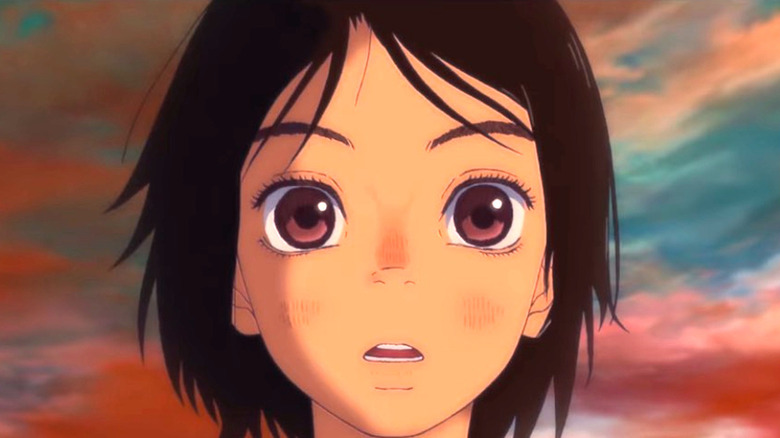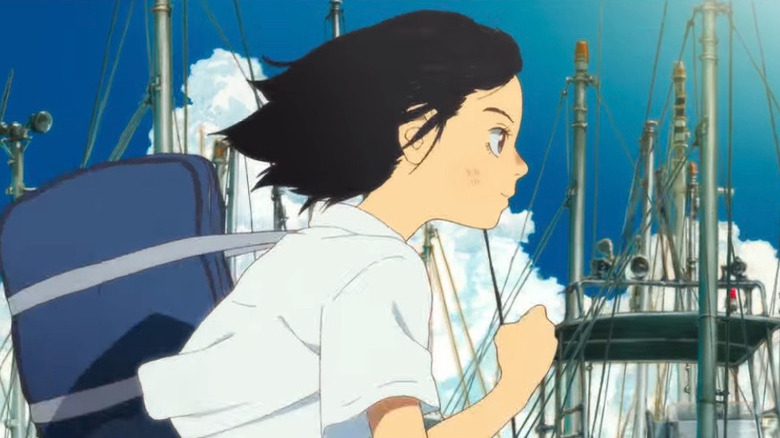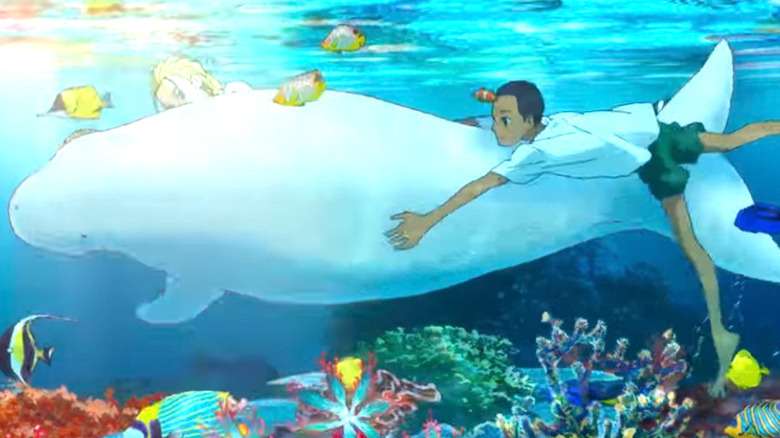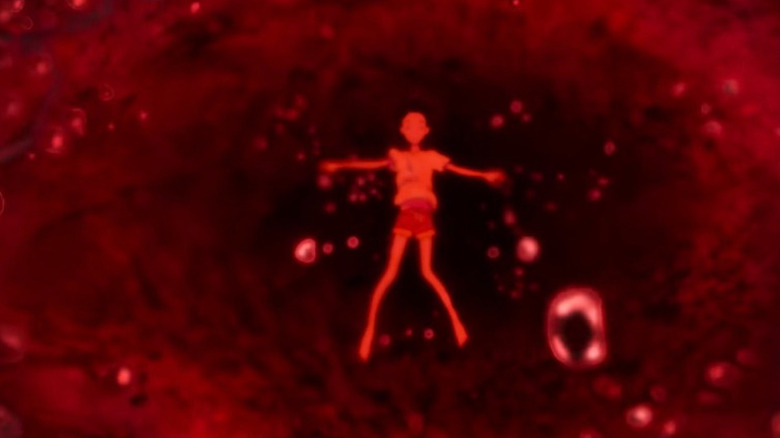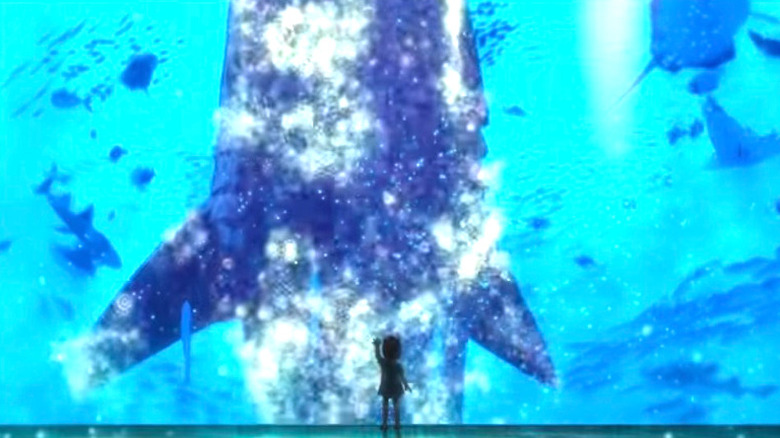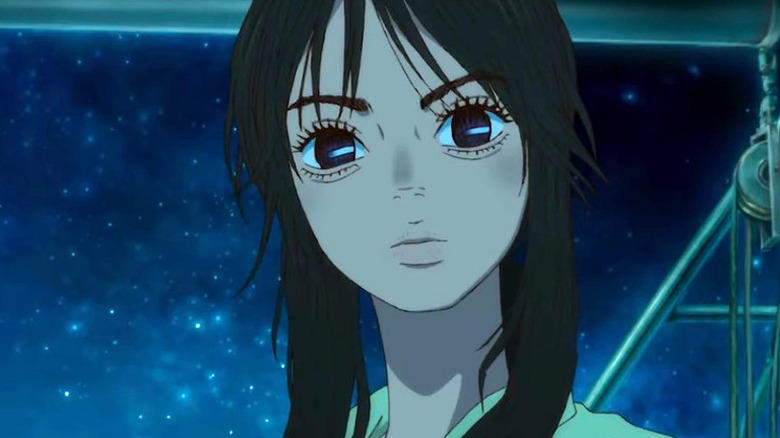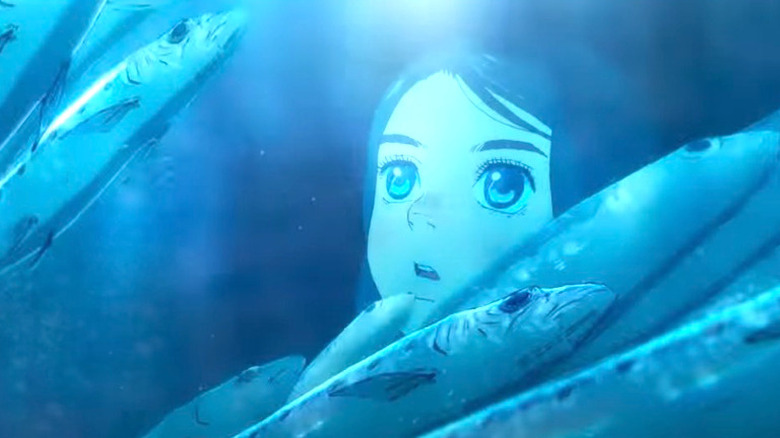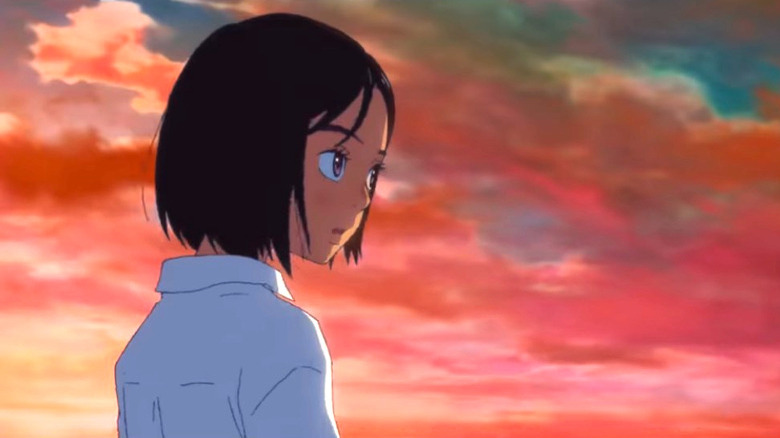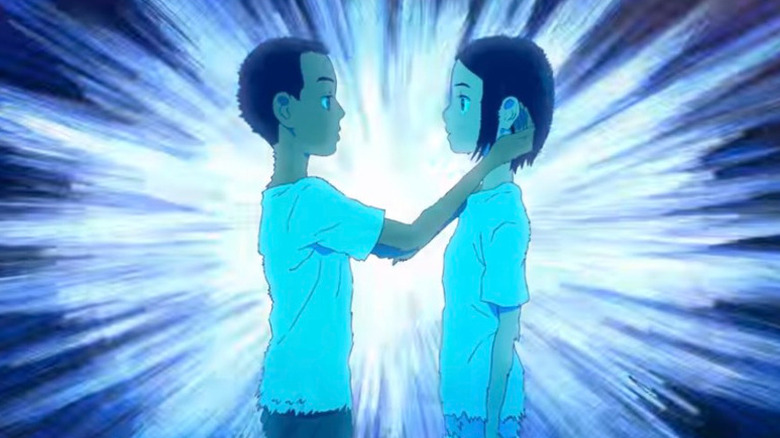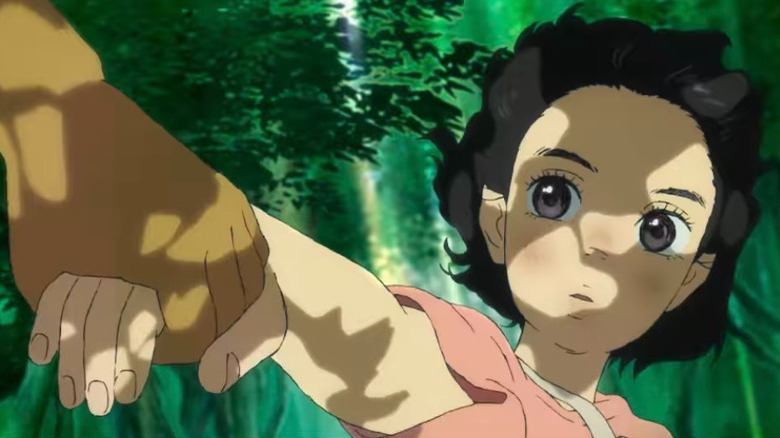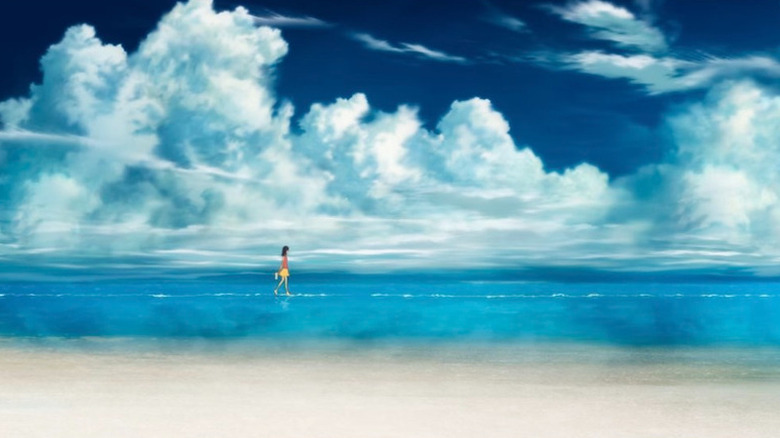The Ending Of Children Of The Sea Explained
"Children of the Sea" is a 2019 animated film from director Ayumu Watanabe. Based on the manga by Daisuke Igarashi, it tells the story of a young girl named Ruka coming of age during the most incredible and baffling summer vacation of her life. It is more than just the film's stellar animation that instills awe in the viewer; it is also a dense meditation on the nature of existence and how frighteningly little we understand ourselves, the world around us, and the universe at large.
At its core, the film is about someone realizing that they are part of something greater, while also accepting the fact that they will never fully understand the overall context of life itself. If you felt a little lost or confused by the end, there is an argument to be made that you're supposed to feel that way — not because the filmmakers are trying to make you feel inadequate, but because that is the plight of the main character.
In fact, as we will discuss below, the film posits that is the plight of all life. We're all given glimpses into things that exist beyond our understanding, leaving us shaken and the unknowable grandeur of it. We will go through life learning more and more about the nature of things, but the chances of us understanding all of it are virtually impossible. That being said, this piece intends to help you accept that being confused by "Children of the Sea" is absolutely fine.
How Ruka spent her summer vacation
The film begins and ends with Ruka telling us her point of view on this particular summer that changed everything. At first, she is thrilled about her time off. She feels like she can float right off her feet. Then a girl makes her fall and skins her knee during a game. This makes her so upset that she retaliates by elbowing the girl in the face, breaking her nose. The gym teacher gives Ruka the chance to explain herself, but she can't. Her actions were obviously justified in her mind, but this authority figure is considering punishment.
This infuriates her, but she doesn't express that to anyone. Instead, she runs off to be with herself. Eventually, she goes to visit her father at the aquarium where he works. It's here that she meets Umi, the character that would change her life. At the end of the film, Ruka has changed. She's just been through something she doesn't understand, and she seems almost okay with that.
The Ruka at the end of summer break doesn't hold a grudge against the girl that skinned her knee. She understands that this person may seem like her complete opposite, but they're actually pretty alike. She is the sky and Ruka is the sea and they are united in their differences and similarities in equal measure. Why that is will take a bit more time to explain, but it's important to understand that change right up front.
The secrets of Umi and Sora
While trying to find her father at the aquarium, Ruka encounters a boy named Umi. He jumps into the tank with all the sea life and swims as if he belongs there. When Ruka approaches the glass to get a better look, he swims up to it and is able to speak in the water. The movie never explains how he has this ability, other than to say that he exists outside of our understanding.
Umi was found in the water along with another boy named Sora. While Umi is fun and adventurous, Sora is colder and distant. He insults Ruka upon meeting her, while Umi invites her to play. Researchers are trying to understand these two boys because it appears that they were raised by dugongs (mammals similar to manatees) and struggle with life outside of the water.
There are several scenes wherein characters theorize as to Umi and Sora's nature, but nothing really definitive emerges, except for Dehdeh (a character with a problematic design) at the end who says, "The clues we get to unlock the secrets of the world are revealed in many forms. The goddess of the whale, boys who slip through time. They reach out to us, touching us with their messages traveling on the wind. The universe exists everywhere in disguise right in front of us." Umi and Sora are evidence that the universe is reaching out to us. We, like Ruka, just aren't able to understand why.
The birthing festival
The very first images of the film are of researchers listening to whales communicate in a song they've never heard before. The rest of the ocean seems to be reacting to the information being communicated through the song and migrating somewhere. Throughout the narrative, we cut back to this migration and learn that the whales are rallying everyone to something called the birthing festival.
What the festival is and its nature are unclear. Why the military thinks observing it will lead to greater innovations in oceanic exploration is also unclear. We do know, however, that this event is incredibly important. Not just to the creatures swimming around the ocean, but to the universe itself. Ruka is taken to the festival as the chosen guest of the humpback whale that is organizing the whole thing.
It's here that she sees (through trippy visuals that put "2001: A Space Odyssey" to shame) the expansive nature of reality. Dehdeh explains that celestial objects come to Earth and fertilize life in the sea which serves as the womb for new lifeforms. We see Umi glow and dissolve, becoming thousands of tiny galaxies floating through the ocean, being gobbled up by turtles, and more. It is the transformation his journey has been leading towards: the birth of something new and unknowable. In a way, Umi now exists in everything.
Glowing things want to be found
When Ruka was little, she saw a whale shark in an aquarium tank much too small for it. The animal swam up to the glass, its skin glowing as though it were covered in diamonds. She came to think of this as a ghost because it disappeared. After meeting Umi and Sora, she sees more glowing whale sharks and discovers that her new friends saw the same thing she did when they were little and they also referred to it as a ghost.
Umi also takes Ruka out to the water to witness what he calls will o' the wisps, but everyone else thinks are meteorites. Just when she thinks he's playing a joke on her, the glowing objects from space streak through the sky. When Ruka asks how he knew they'd be here, he said that glowing things want to be found. It reminds her of how he found her hiding out at school earlier that day. She also wanted to be found.
During her discussion with Dehdeh, Ruka says she doesn't feel worthy of the experience with Sora and Umi and is told that she's perfect just the way she is. The universe found her because she was looking for a greater understanding. But also, the universe wanted to be seen by her. She might not think she's worthy, but if what the rest of the movie has to say about existence is correct, she is just as worthy as anyone else.
It's all about what you don't see
Further proof that the film wants you to be at least a little confused comes in a scene around a campfire where Ruka, Sora, and Umi discuss the universe with an oceanographer named Anglade. He explains that we are only capable of seeing a fraction of existence. Dehdeh says the same thing, only she uses a boat's sail as a metaphor. Basically, we grasp what we can and make it work for us.
Anglade points out that with all of mankind's advanced technology, it discovered the existence of dark matter. Although dark matter cannot currently be observed, its mass is 10 times that of regular matter. He theorizes that this means 90% of the universe exists but cannot be seen. Therefore, we can't possibly understand everything. The ending of this movie shows us all kinds of things we can identify, but it doesn't tell us what it all means and how they relate to one another.
We know Sora's body is transforming, he tells us this. We see it start to happen, but we (just like the scientists studying him) don't know why. The same goes with Umi later on. Clearly, he ascends into a new form, but its ultimate purpose is still a complete mystery to us, Ruka, and the researchers. We're simply not meant to know.
Humans are not superior
There's a subplot to the movie that doesn't pay off in a traditional sense. The researchers we meet are trying to help Sora and Umi. Sora especially is showing signs that his life will be ending soon, so Jim and Anglade are working against the clock to figure out what's wrong. At the same time, Jim is meeting with men who work for the military. All we know about them is that they want to find the birthing festival because it can help them improve oceanic research.
As the birthing festival begins, we see military ships following the mass migration. However, that's the last we see of them. What they're up to never gets mentioned again. Earlier, Anglade and Jim have a conversation about what's to come and how to help Sora. Anglade says he was told by Dehdeh that he needs to protect Sora and Umi from those who think they know better.
They need to be protected from humans who believe that they are superior to all other life in the universe. This suggests that the military men Jim has had meetings with want to find the festival for nefarious reasons. The film shows us that mankind is not superior in two ways: First, it literally says that everything in the universe is connected and equal; and second, no human other than Ruka witnesses the festival. These men who view themselves as greater never reach the festival because what's going on is beyond their grasp.
Learning how to deal
Another important relationship in the film is the one between Ruka's parents Masaaki (voiced by Marc Thompson from "Yu-Gi-Oh!") and Kanako. When the movie begins, Ruka is avoiding her mom. Kanako tries to talk with her, but Ruka shuts it down. We're not privy to the specifics of what went down, but it's clear that Kanako and Masaaki have separated, Kanako has resorted to coping with alcohol, and she is in such a deep depression that she's even taken a leave of absence from work.
Just before the birthing festival, Masaaki talks with his wife. She says that he and Ruka are exactly alike because they don't want to be around her drinking. Masaaki points out that she and Ruka are more alike because neither of them knows how to share their emotions. They want people to understand them, but they can't find a way to communicate. Both of them want to be found, in a way.
Masaaki admits that he didn't know how to deal with it before, but now he does. He even takes her empty beer cans away for her. This mirrors Ruka's own journey of accepting that there are things about her life she just won't understand. By trying to make sense of everything, all she's doing is hurting herself and others (like the girl from school). By accepting her own faults and inabilities, she is able to work through them and move on — just like her parents.
If you or anyone you know is struggling with addiction issues, help is available. Visit the Substance Abuse and Mental Health Services Administration website or contact SAMHSA's National Helpline at 1-800-662-HELP (4357).
Everything is everything
You may have noticed edits in the film that didn't really fit at the time. During several conversations, the scene would cut away to an insect going about its business or Ruka's skinned knee. At first, it feels like these moments are just there to add texture to the environment or to make it more grounded and real. As the film progresses, though, you start to suspect that maybe these little moments are actually trying to tell us something.
In the end, it's related to Umi's transcendence. He takes the glowing rock from Ruka and begins to glow himself. Then, his body dissolves into all those galaxies in the water that the sea life eats. Then Anglade looks at the stars through a telescope. He soliloquizes that if the matter comes from the cosmos and everything in existence is made up of that matter, then everything in the universe is part of the universe itself and we are all one.
This is why the movie pays careful attention to showing us all the lifeforms surrounding us. They remind us that we're all connected. Even Ruka with her skinned knee is part of the cosmos. That's why she was worthy of witnessing the birthing festival: She's technically already part of it. When Umi transforms and breaks apart, everything that he was him is now dispersed and shared by everyone and everything. So when Ruka says she just wants to be with Umi forever, she can be — because she already is.
Reunited and renewed
An argument could be made that the real heart of this story is about how Ruka learns to reconnect with her mother. Stories, especially movies, are usually designed to transform a character. They begin one way and end up another way. That's a simplification of the power of stories, but that is basically what they do: transform characters. We know that Ruka starts off frustrated that she can't communicate her feelings and ends up accepting that, but that's not the only change she goes through.
There's a moment when Ruka realizes she remembers the words to a lullaby her mother used to sing to her. They're very similar to words said by Dehdeh. During this epiphany, she thinks to herself (through voiceover) that her mom exists inside her. She is coming to the same conclusion that her father has about her relationship with her mother — they're just alike and that pushes them away.
We don't get a scene where Ruka and her mom put aside their differences for a cathartic reunion, but we do have a post-credits scene where Ruka meets her new sibling. She and her mom seem to be on good terms here. Kanako even asks Ruka to cut the umbilical cord. So we can rest assured that mother and daughter have come together and have a newfound respect for one another. Maybe that's all the universe wanted from the very beginning.
The end is the beginning
Given all the time the film spends discussing the interconnectivity between all things, it isn't very difficult to figure out the significance of Ruka cutting the umbilical cord. It is a part of human anatomy that directly connects a child to the one carrying it. By severing it, Ruka feels like she is ending a life, removing someone from the universe it was so directly connected to. Thankfully, she goes for a walk on the beach which should put things back into perspective.
Her thoughts naturally turn to Umi and how much she misses him. She's a little older and wiser now. Her time with Umi was free and exciting and it felt like anything was possible. In this way, Umi represents the childhood she's lost with age. She mourns the absence of this freedom and innocence. Then, a crab walks out from the waves and looks at her. They share a moment of eye contact just before the film officially ends.
If Umi was the universe, and his rebirth during the birthing festival resulted in his memories and feelings becoming part of the food everyone uses for nourishment, then that crab is Umi. Not only that, it's Sora as well. Then, if we're all made up of the same matter (maybe even dark matter — if we ever learn how to examine it — then we are all Umi and Sora. Ruka doesn't need to feel badly about disconnecting her sibling from their mother or losing Umi because she is part of them, they are part of her, and (as Carl Sagan said) "we're made of star stuff."
